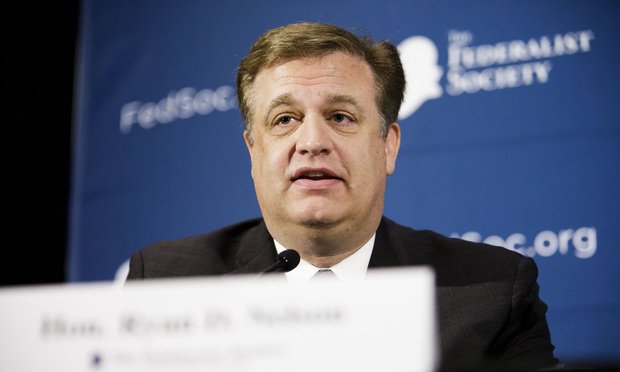Ninth Circuit Wants to Downsize Qualcomm Class Action
A three-judge panel sounded highly skeptical of U.S. District Judge Lucy Koh's decision to certify a nationwide consumer class based on California antitrust law. But they suggested that a California only class—or California plus a handful of other states—might pass muster.
December 02, 2019 at 04:21 PM
5 minute read
 Judge Ryan Nelson of the U.S. Court of Appeals for the Ninth Circuit.
Judge Ryan Nelson of the U.S. Court of Appeals for the Ninth Circuit.
The chances of the U.S. Court of Appeals for the Ninth Circuit approving a nationwide class of some 250 million cellphone purchasers against Qualcomm Inc. sounded close to zero Monday morning.
But a Ninth Circuit panel featuring Judges Jay Bybee and Ryan Nelson wasn't ruling out a California-only antitrust class, or even including other states with similar antitrust laws, which could still be worth billions of dollars.
"It seems like this argument does not undermine a statewide action in California, and perhaps even a larger class action that included other states whose law [is] similar," Nelson told Keker, Van Nest & Peters partner Robert Van Nest, representing Qualcomm.
Van Nest argued that U.S. District Judge Lucy Koh of the Northern District of California made other errors of law last year when she certified what Qualcomm calls the largest class in history. But Nelson and Bybee suggested those arguments involve fact issues that the Ninth Circuit would have to review with more deference to Koh.
Stromberg v. Qualcomm is a follow-on to Federal Trade Commission v. Qualcomm, the government's groundbreaking and controversial antitrust case over Qualcomm's intellectual property licensing practices. Koh in 2018 certified a class of consumers in the former, then found antitrust violations following a 2019 bench trial in the latter. The Ninth Circuit is scheduled to review the bench trial and her order enjoining Qualcomm's "no license no chips" policy in February.
The class Koh certified covers 1.2 billion cellphone purchases by some 250 million individuals and entities all over the country. Koh found "compelling" evidence that Qualcomm used its control over modem chip supply to bully smart phone manufacturers into paying inflated royalties for its standard-essential patents. The plaintiffs contend those higher royalties were ultimately borne by consumers.
Qualcomm argues that Koh improperly applied California antitrust law to a nationwide class contrary to Ninth Circuit precedent, relied on a "pass-through" theory that other courts have rejected, and "casually" dismissed due process and manageability concerns surrounding the massive class.
"The district court chose to federalize California policy and impose it on all other states," Van Nest told the court. The states that have rejected California's approach to indirect purchasers, like cellphone buyers, "have made a choice that they don't want folks doing business there to face excessive litigation" or double recovery.
Van Nest got little argument from Nelson. "Isn't it even more fundamental than that?" he said. "You have multiple state law issues that make uniformity of the law in one nationwide class action impracticable."
"That's right, your honor," Van Nest replied.
But even if the class were narrowed to California only, Van Nest said, that plaintiffs didn't make a sufficient showing of commonality. Tens of millions of buyers weren't injured, because they paid nothing for their phones due to discounts and incentive, Van Nest argued as one example.
Bybee said the cost might still be passed through in the form of higher monthly fees or reduced feature set, but Van Nest argued that's only a theory that the plaintiffs never proved. "You can't certify a class based on a theory," he told the court.
Nelson cut him off. "I appreciate your arguments. I think they're really strong," he said. "But everything you're arguing [on commonality], we would have to find that district court abused its discretion. And I feel like you're re-arguing some of the same arguments you made below."
Susman Godfrey partner Marc Seltzer argued that a nationwide class is appropriate, because all of Qualcomm's business dealings with smartphone makers were based in California. It's "wrongdoing taking place in California, within California's borders, by a California company," he said.
Nelson didn't sound convinced. "All states have treated this differently, and now we have California coming in and saying we're going to rule the entire United States, literally," said Nelson, whose chambers are in Idaho. "You understand why those who don't live in California get a little bit frustrated with that kind of approach?"
Seltzer argued that there's no evidence that applying California law would affect competition in other states. "You have to apply it to the facts of the case," he told the court.
"You're saying stick to the facts—you stick to the facts. You're overstating your case," Nelson told him. "Stop it."
Though Monday's arguments were focused on class procedure, they offered a slight glimpse into how some Ninth Circuit judge might view the FTC's case.
"If we affirmed the FTC action," Bybee assked, "would that be collateral estoppel about this question of persuasive evidence" that liability can be established commonly?
Van Nest said it would not, because Koh held a bench trial on the FTC case, and Qualcomm has demanded a jury trial in the class action.
Nelson asked if a decision on the FTC's injunction would control any injunction that could be ordered in Stromberg. Van Nest said it's not clear exactly what injunctive relief the consumer class is seeking.
"Well, that's a question for a later day," Nelson suggested.
"That's a question for a later day," Van Nest agreed.
Mary Helen Wimberly argued briefly for the Justice Department's Antitrust Division in support of Qualcomm. Judge Eugene Siler Jr., visiting from the Sixth Circuit, rounded out the Ninth Circuit panel.
This content has been archived. It is available through our partners, LexisNexis® and Bloomberg Law.
To view this content, please continue to their sites.
Not a Lexis Subscriber?
Subscribe Now
Not a Bloomberg Law Subscriber?
Subscribe Now
NOT FOR REPRINT
© 2025 ALM Global, LLC, All Rights Reserved. Request academic re-use from www.copyright.com. All other uses, submit a request to [email protected]. For more information visit Asset & Logo Licensing.
You Might Like
View All
White & Case KOs Claims Against Voltage LLC in Solar Companies' Trade Dispute


'A Death Sentence for TikTok'?: Litigators and Experts Weigh Impact of Potential Ban on Creators and Data Privacy

‘Extremely Disturbing’: AI Firms Face Class Action by ‘Taskers’ Exposed to Traumatic Content
5 minute readLaw Firms Mentioned
Trending Stories
Who Got The Work
J. Brugh Lower of Gibbons has entered an appearance for industrial equipment supplier Devco Corporation in a pending trademark infringement lawsuit. The suit, accusing the defendant of selling knock-off Graco products, was filed Dec. 18 in New Jersey District Court by Rivkin Radler on behalf of Graco Inc. and Graco Minnesota. The case, assigned to U.S. District Judge Zahid N. Quraishi, is 3:24-cv-11294, Graco Inc. et al v. Devco Corporation.
Who Got The Work
Rebecca Maller-Stein and Kent A. Yalowitz of Arnold & Porter Kaye Scholer have entered their appearances for Hanaco Venture Capital and its executives, Lior Prosor and David Frankel, in a pending securities lawsuit. The action, filed on Dec. 24 in New York Southern District Court by Zell, Aron & Co. on behalf of Goldeneye Advisors, accuses the defendants of negligently and fraudulently managing the plaintiff's $1 million investment. The case, assigned to U.S. District Judge Vernon S. Broderick, is 1:24-cv-09918, Goldeneye Advisors, LLC v. Hanaco Venture Capital, Ltd. et al.
Who Got The Work
Attorneys from A&O Shearman has stepped in as defense counsel for Toronto-Dominion Bank and other defendants in a pending securities class action. The suit, filed Dec. 11 in New York Southern District Court by Bleichmar Fonti & Auld, accuses the defendants of concealing the bank's 'pervasive' deficiencies in regards to its compliance with the Bank Secrecy Act and the quality of its anti-money laundering controls. The case, assigned to U.S. District Judge Arun Subramanian, is 1:24-cv-09445, Gonzalez v. The Toronto-Dominion Bank et al.
Who Got The Work
Crown Castle International, a Pennsylvania company providing shared communications infrastructure, has turned to Luke D. Wolf of Gordon Rees Scully Mansukhani to fend off a pending breach-of-contract lawsuit. The court action, filed Nov. 25 in Michigan Eastern District Court by Hooper Hathaway PC on behalf of The Town Residences LLC, accuses Crown Castle of failing to transfer approximately $30,000 in utility payments from T-Mobile in breach of a roof-top lease and assignment agreement. The case, assigned to U.S. District Judge Susan K. Declercq, is 2:24-cv-13131, The Town Residences LLC v. T-Mobile US, Inc. et al.
Who Got The Work
Wilfred P. Coronato and Daniel M. Schwartz of McCarter & English have stepped in as defense counsel to Electrolux Home Products Inc. in a pending product liability lawsuit. The court action, filed Nov. 26 in New York Eastern District Court by Poulos Lopiccolo PC and Nagel Rice LLP on behalf of David Stern, alleges that the defendant's refrigerators’ drawers and shelving repeatedly break and fall apart within months after purchase. The case, assigned to U.S. District Judge Joan M. Azrack, is 2:24-cv-08204, Stern v. Electrolux Home Products, Inc.
Featured Firms
Law Offices of Gary Martin Hays & Associates, P.C.
(470) 294-1674
Law Offices of Mark E. Salomone
(857) 444-6468
Smith & Hassler
(713) 739-1250






